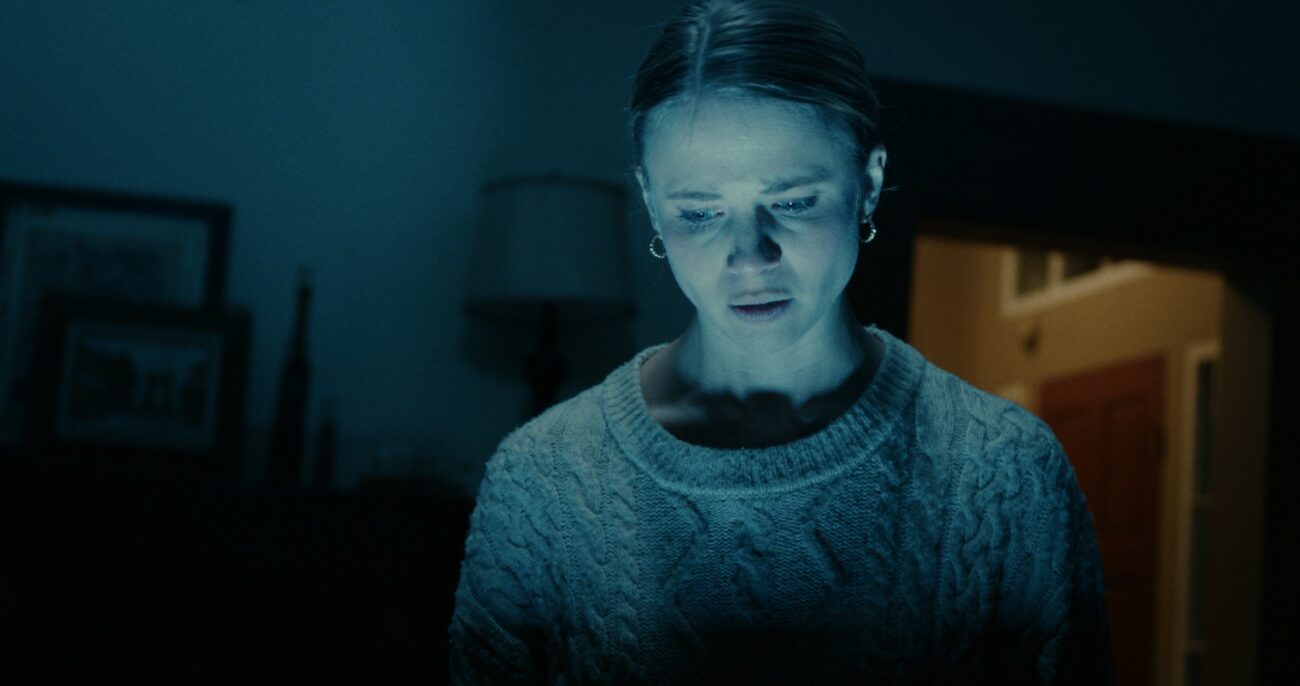When you think about revenge movies, what comes to mind? For most of us, it’s probably John Wick-esque action thrillers about badass heroes who go after the villains and wreak glorious vengeance, and understandably so. The majority of revenge films follow that basic blueprint, but there are some notable exceptions. A number of them offer much more thoughtful and more realistic takes on the subject, and one of the best of that bunch is the 2005 gem Lady Vengeance.
Lady Vengeance was directed by Park Chan-wook, the same guy who gave us the classic anti-vengeance revenge thriller Oldboy, and much like its more famous cinematic sibling, this one also turns the entire revenge template inside out. It shows in no uncertain terms that vengeance is far from the glamorous and noble pursuit Hollywood often makes it out to be, so it helps bring some much-needed balance to an overly one-sided genre. It’s a really unique take that makes for a fascinating and poignant viewing experience, so let’s dive into Lady Vengeance and see just what it has to say about the evils of revenge.
The Basic Plot of Lady Vengeance
But first, let’s take a moment to go over the basic plot of the movie. Lady Vengeance is about a woman named Lee Geum-ja who went to jail for murdering a young boy named Won-mo, and now, 13 years later, she’s out of prison and looking for revenge. See, even though she readily confessed to the crime, she actually didn’t do it. The real culprit was a former teacher of hers named Mr. Baek.
Back when Geum-ja was in high school, she got pregnant unexpectedly and went to Baek for help, but the man just took advantage of her vulnerable state and used her to commit an unspeakable crime. He had Geum-ja help him kidnap Won-mo, and he was going to demand a ransom from the kid’s parents. However, he ended up killing the child instead, and he kidnapped Geum-ja’s baby daughter and threatened to kill her too if Geum-ja didn’t take the blame for the murder.
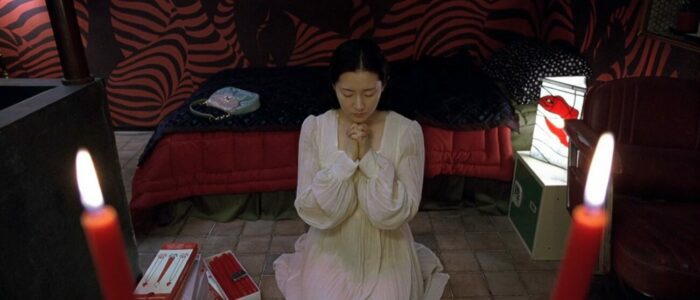
Geum-ja was sentenced to 13 years in prison for that crime, and she spent the entire time plotting her revenge. She made a lot of friends during those years, and when she’s finally released, she goes to those friends and asks them to help her execute her plan. That strategy works just about flawlessly, so Geum-ja is able to track Baek down and tie him up relatively easily.
However, before she kills him, she discovers that Won-mo wasn’t the guy’s only victim. Rather, he had a habit of kidnapping and killing kids, so Geum-ja gathers the parents and relatives of all the children Baek murdered and reveals the ugly truth to them. Unsurprisingly, these people are totally outraged, and they decide to take matters into their own hands. They take turns torturing Baek until they kill him, and afterwards, they bury the body, eat some cake, and then go home.
“Go F*ck Yourself”
From that brief plot synopsis, you might think that Lady Vengeance is in fact a typical revenge thriller. After all, unlike in Oldboy, the aggrieved protagonist gets her revenge this time, so it can be tough to see how the film upends the typical genre template. However, if we pay attention to some important details, we’ll see that Lady Vengeance is anything but typical. Instead, the movie makes it very clear that vengeance will only leave us empty and unfulfilled, and to see how, we have to start at the beginning.
When Geum-ja walks out of prison, she’s confronted by a Christian pastor who ministered to her during her time there, and he presents her with a block of tofu. He says it’s a tradition to eat tofu upon one’s release from jail, and he explains that it represents her commitment to “live white as snow and never sin again.” However, to his surprise, Geum-ja doesn’t accept it. Instead, she turns the plate over and dumps the tofu on the ground, and she tells the guy, “Go f*ck yourself.”
The first time you watch Lady Vengeance, that moment might not seem terribly important. Sure, it gives Geum-ja the badass vibe action heroes need, and it shows how committed this woman is to her pursuit of vengeance, but that’s about it. The scene doesn’t appear to tell us anything we don’t already know from the movie’s title and premise, so you’d be forgiven if you just glossed over it without giving it much thought. But in reality, this moment is actually super important. It forms the backdrop for the film’s entire message, so if you don’t remember it, you’re not going to understand the final scene.
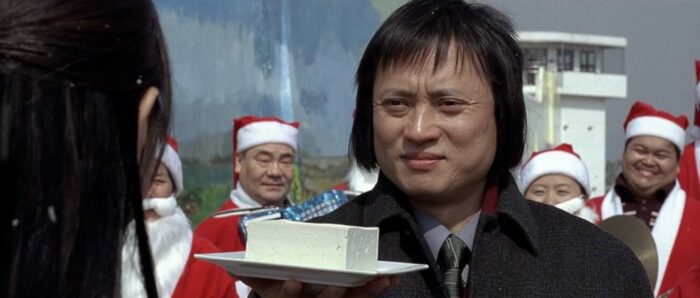
Now, we’ll get to that ending in a little bit, but before we do, I want to go over one more important moment that sets up the hard-hitting finale. Sometime after Geum-ja’s release, she’s talking to one of her former prison mates, and the woman remarks that Geum-ja has changed her style. In particular, she asks why Geum-ja is wearing red eyeshadow, and Geum-ja answers, “I don’t want to look kind-hearted.”
Once again, this line probably won’t mean much to you the first time you hear it. It seems like just another way to hammer home that this is not a woman to be trifled with, so Baek had better watch out. But as you can probably guess, there’s a lot more to it than that. Granted, it’s not as important as the tofu scene, but it too foreshadows a key moment in the finale that contributes to the film’s anti-vengeance message.
Wiping off the Eyeshadow
Now that we’ve gotten all the setup out of the way, it’s time to dive into the good stuff. Like I said before, when Lady Vengeance begins, it seems like the movie is going to be just another stereotypical revenge thriller, albeit with a more clever mode of execution. However, once the vengeance actually happens, it becomes clear that this is not the cathartic release we were expecting.
For starters, when the first parent finishes torturing Baek, she has a look of shock on her face. It’s like she’s been traumatized all over again, so this has definitely not been a good experience for her. There are a few other similar moments during Baek’s torture as well, but they’re just the tip of the iceberg.
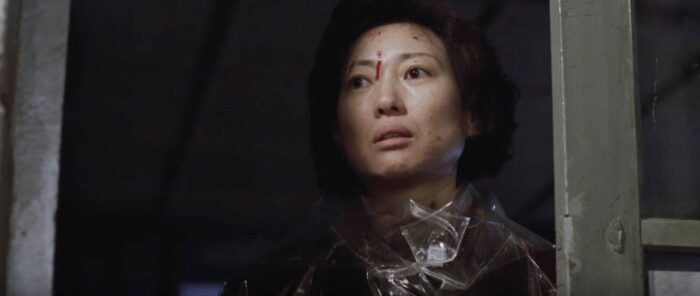
The real heart of Lady Vengeance comes in the final few minutes, after the guy is dead and buried. Once the whole grisly affair is done, Geum-ja and her cohorts head over to the bakery where she works, and there’s a scene where Geum-ja goes to the bathroom and wipes off her red eyeshadow.
If you don’t remember why she wore that makeup, this moment might go over your head, but if you remember that she dons the eyeshadow so she doesn’t “look kind-hearted,” it takes on a world of meaning. It shows that Geum-ja is ready to put her pursuit of vengeance behind her and truly become the kind-hearted person she pretended to be in prison. During that time, she only helped people to further her own plans for revenge, but now, she’s going to do it for real. She’s finally ready to be kind for its own sake.
“Live White”
To be fair, that doesn’t necessarily imply that revenge is bad. It could just mean that Geum-ja got the desire for vengeance out of her system, and now she’s ready to live a more normal life. However, the final scene of Lady Vengeance tells a very different story. When Geum-ja walks out of the bakery, she’s carrying a somewhat odd-shaped box, and the narrator explains that the poor woman “still couldn’t find the redemption she so desired.” Then, almost immediately after we hear those words, Geum-ja runs into her daughter, Jenny. They’ve had a bit of a rocky relationship ever since Geum-ja got out of prison and reconnected with her, but this time, there’s nothing but love between them.
Geum-ja hugs her daughter as tight as she can, and then she opens up the box and shows Jenny what’s inside. Significantly, it’s a white cake, and Geum-ja tells her daughter, “Be white, and live white, like this.” As kids are wont to do, the girl eats some of the white frosting on the cake, and she responds, “You too.” Next, Jenny looks up at the snow falling from the sky and remarks, “More white,” and when Geum-ja looks up too, her entire demeanor changes. She starts to cry, and then she buries her head in the cake and begins to eat it herself.
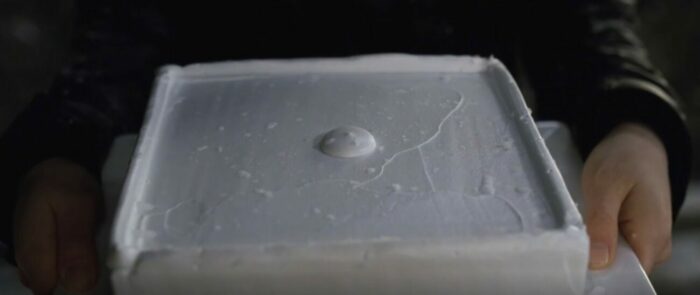
On its own, this ending can seem pretty bizarre, but if we remember the tofu scene at the beginning of Lady Vengeance, it actually becomes really touching. Remember, the tofu symbolized Geum-ja’s commitment to “live white as snow and never sin again,” but the woman rejected it. She wanted to sin again, so she just tipped the tofu over onto the ground. But now, she’s finally ready to accept her pastor’s invitation. She wants to turn her life around, and she expresses that decision by eating the white cake. What’s more, Geum-ja also wants her daughter to “live white.” She wants the girl to be a good person as well, and even though she doesn’t explain why, it’s not hard to figure out for ourselves.
As the narrator said, getting revenge on Baek didn’t bring Geum-ja “the redemption she so desired.” In other words, even though she dedicated every waking moment of the last 13 years to this pursuit, it still didn’t bring her the peace and fulfillment she thought it would. Instead, it just left her empty, and she realized that the last decade of her life was a complete waste of time. She finally sees that “living white” and being good is the only way to be happy, so she wants to help her daughter avoid making the same mistake she did.
It’s a really poignant moment, and everything about the scene, from the music to the cinematography to the performances, hammers home just how unsatisfied Geum-ja’s quest for vengeance has left her. It shows without a doubt that this is an utterly hollow pursuit, so if we want to lead happy and fulfilling lives, we only have one choice. We have to “live white.”


